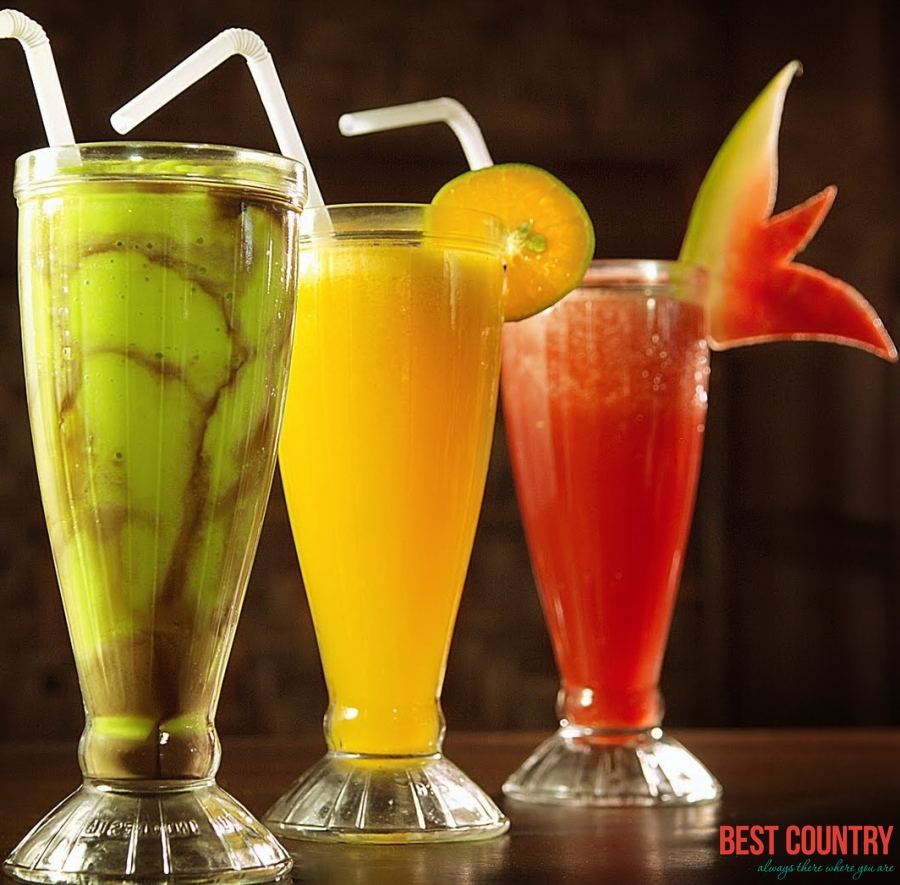Tap water is generally not potable in Indonesia. Water or ice served to you in restaurants may have been purified and/or boiled (air minum or air putih), but do ask. Bottled water, usually known as Aqua after the best-known brand, is cheap and available everywhere, but check that the seal is intact.
Drinks in Indonesia
 Most hotels provide free drinking water because tap water is rarely potable. Do not use tap water for brushing your teeth. Also beware of ice which may not have been prepared with potable water or kept in hygienic conditions.
Most hotels provide free drinking water because tap water is rarely potable. Do not use tap water for brushing your teeth. Also beware of ice which may not have been prepared with potable water or kept in hygienic conditions.
Quite a few Indonesians believe that cold drinks are unhealthy, so specify dingin when ordering if you prefer your water, bottled tea or beer cold, rather than at room temperature.
Juices
Fruit juices — jus for plain juice or es if served with ice — are popular with Indonesians and visitors alike, although the hygiene of the water used to make them can be dubious. In addition to the usual suspects, try jus alpokat, a surprisingly tasty drink made from avocadoes, often with some chocolate syrup poured in!
Coffee and tea
Indonesians drink both coffee (kopi) and tea (teh), at least as long as they have had vast quantities of sugar added in. An authentic cup of Java, known as kopi tubruk, is strong and sweet, but let the grounds settle to the bottom of the cup before you drink it.
Last and least, no travel guide would be complete without mentioning the infamous kopi luwak, coffee made from beans which have been eaten, partially digested and excreted by the palm civet (luwak), but even in Indonesia this is an exotic delicacy costing upwards of Rp.200,000 (US$20) for a small pot of brew.
Tea (teh) is also quite popular, and the Coke-like glass bottles of the Tehbotol brand of sweet bottled jasmine tea are ubiquitous.
Jamu
The label jamu covers a vast range of local medicinal drinks for various diseases. Jamu are available in ready-to-drink form as well as in powder satchets or capsules.
Most of them are bitter and drunk for the supposed effect, not the taste. Famous brands of jamu include Iboe, Sido Muncul, Jago, and Meneer; avoid buying jamu from the street as the water quality is dubious.
Traditional drinks
Wedang Serbat - made from star anise, cardamon, tamarind, ginger, and sugar. Wedang means "hot water".
Ronde - made from ginger, powdered glutinous rice, peanut, salt, sugar, food coloring additives.
Wedang Sekoteng - made from ginger, green pea, peanut, pomegranate, milk, sugar, salt and mixed with ronde (see above).
Bajigur - made from coffee, salt, brown sugar, cocount milk, sugar palm fruit, vanillin.
Bandrek - made from brown sugar, ginger, pandanus leaf, coconut meat, clove bud, salt, cinnamon, coffee.
Cinna-Ale - made from cinnamon, ginger, tamarind, sand ginger and 13 other spices.
Cendol/Dawet - made from rice flour, sago palm flour, pandanus leaf, salt, food coloring additives.
Talua Tea/Teh Telur (West Sumatra) - made from tea powder, raw egg, sugar and limau nipis.
Lidah Buaya Ice (West Kalimantan) - made from aloe vera, french basil, javanese black jelly, coconut milk, palm sugar, pandanus leaf, sugar.